
| 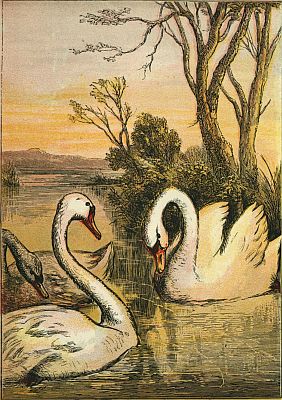
|
Title: Aunt Friendly's Picture Book.
Editor: Sarah S. Baker
Illustrator: Joseph Martin Kronheim
Release date: May 12, 2008 [eBook #25442]
Language: English
Credits: Produced by Marilynda Fraser-Cunliffe and the Online
Distributed Proofreading Team at http://www.pgdp.net (This
file was made using scans of public domain works in the
International Children's Digital Library.)

| 
|

| THE NURSERY ALPHABET. |
| SING-A-SONG OF SIXPENCE. |
| THE FROG WHO WOULD A WOOING GO. |
| THE STORY OF THE THREE LITTLE PIGS. |
| PUSS IN BOOTS. |
| THE UGLY DUCKLING. |
[1]
[2]
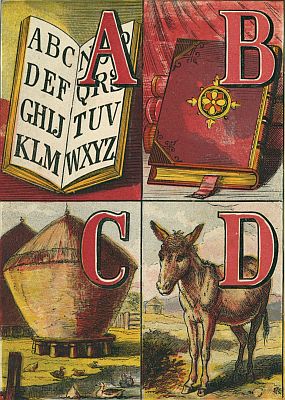 The Nursery Alphabet. A B C D.
The Nursery Alphabet. A B C D.
[3]
[4]
[5]
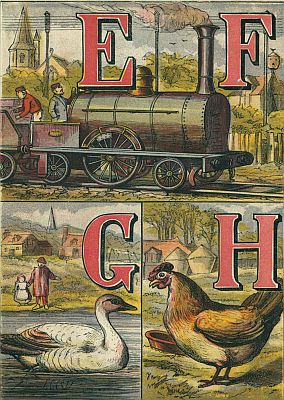 The Nursery Alphabet. E F G H.
The Nursery Alphabet. E F G H.
[6]
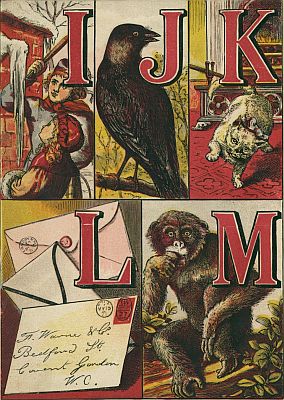
The Nursery Alphabet. I J K L. | 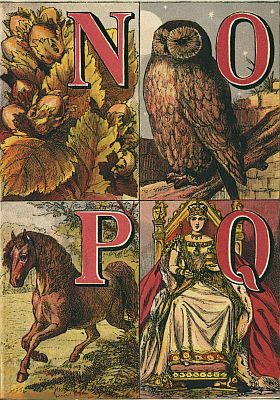
The Nursery Alphabet. N O P Q. |
[7]
[8]
[9]
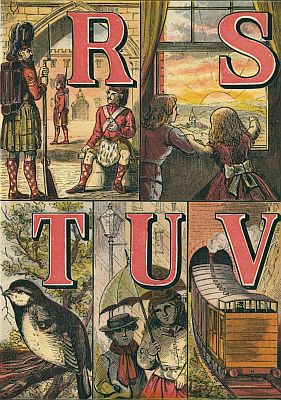 The Nursery Alphabet. R S T U V.
The Nursery Alphabet. R S T U V.
[10]
[11]
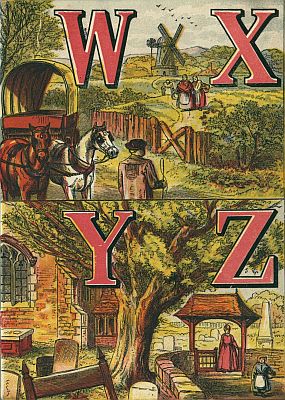 The Nursery Alphabet. W X Y Z.
The Nursery Alphabet. W X Y Z.
[1]
[2]
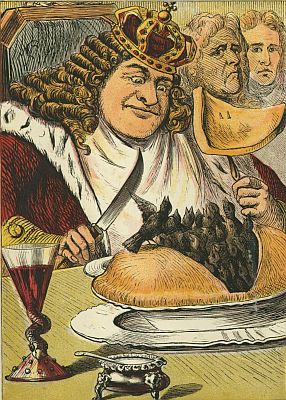
[3]
| The king was in his counting-house Counting out his money; The queen was in the parlour Eating bread and honey. | 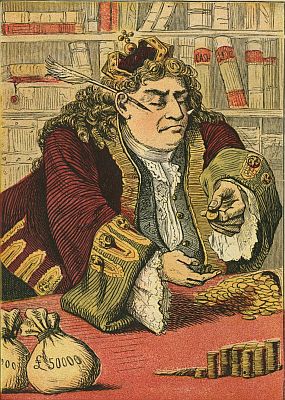
|
[5]
[6]
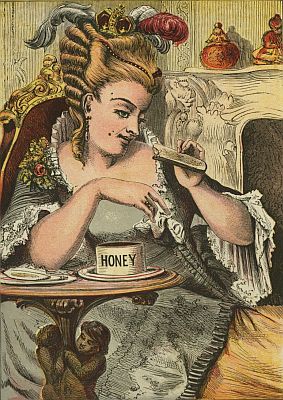
| 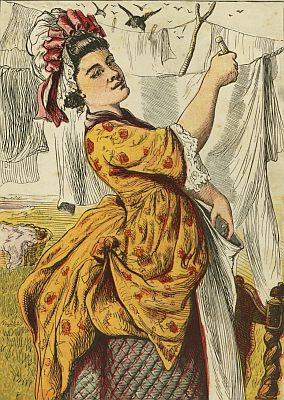
|
[7]
[8]
[9]
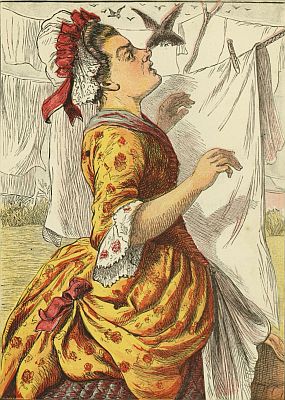
| The maid was in the garden Hanging out the clothes; By came a Jackdaw, And snapt off her nose. |
[10]
| They sent for the king's doctor, Who sewed it on again; The Jackdaw for this naughtiness Deservedly was slain. | 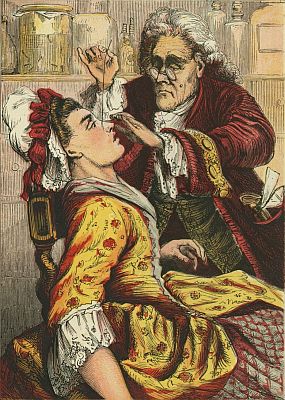
|
[11]
[1]
[2]
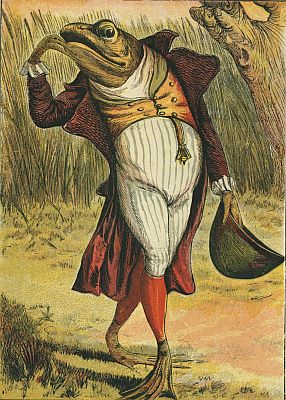
[3]
| A frog he would a wooing go, Whether his mother would let him or no. So off he marched with his nice new hat, And on the way he met a rat. | 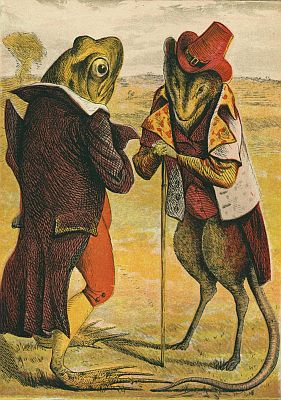
|
[4]
[5]
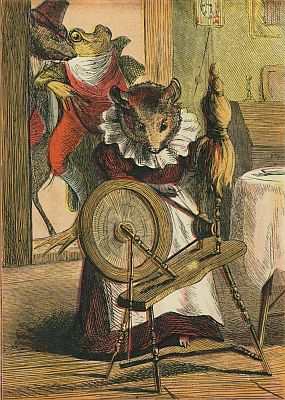 | When they came to the door of the Mouse's Hall, They gave a loud knock, and they gave a loud call. "Pray Mrs. Mouse, are you within?" "Oh yes, Mr. Rat, I am learning to spin." "Pray Mrs. Mouse, will you give us some beer? For Froggy and I are fond of good cheer." |
[6]
[7]
[8]
[9]
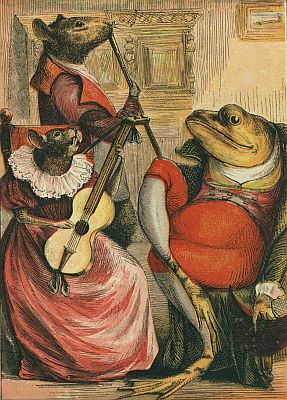
| 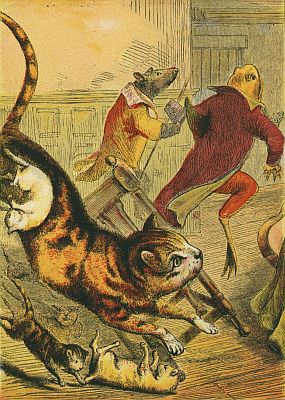
|
[10]
| As Froggy was crossing him over a brook, A lilly-white duck came and gobbled him up. So there was an end of one, two, and three, The Rat, the Mouse, and the little Froggee? | 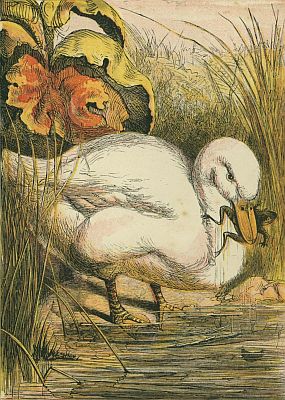
|
[11]
[1]
[2]
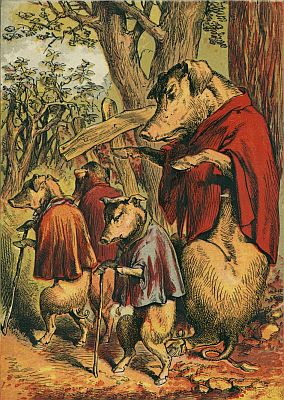
[3]
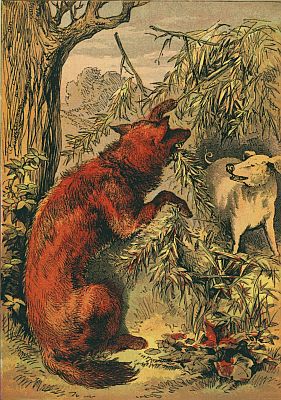
"Little pig, little pig, let me come in."
To which the pig answered,—
"No, no, by the hair of my chiny chin chin."
The wolf then answered to that,—
"Then I'll huff, and I'll puff, and I'll blow your house in."
So he huffed and he puffed, and he blew his house in, and eat up the little pig.
The second little pig met a man with a bundle of furze, and said, "Please man give me that furze to build a house;" which the man did, and the pig built his house. Then along came the wolf, and said,—
"Little pig, little pig, let me come in."
"No, no, by the hair of my chiny chin chin."[4]
[5]
"Then I'll puff and I'll huff, and I'll blow your house in."
So he huffed, and he puffed, and he puffed, and he huffed, and at last he blew the house down, and he eat up the little Pig.
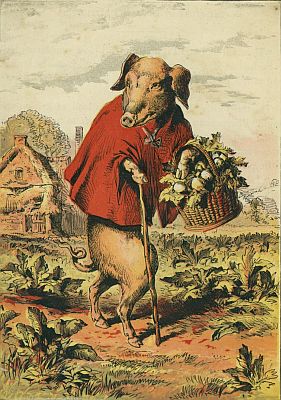
| 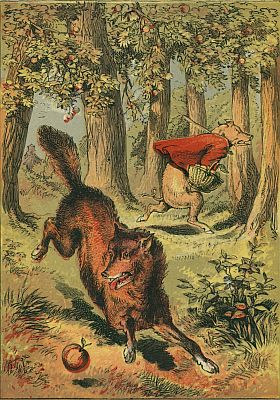
|
The third little pig met a man with a load of bricks, and said, "Please, man, give me those bricks to build a house with;" so the man gave him the bricks, and he built his house with them. So the wolf came, as he did to the other little pigs, and said,—
"Little pig, little pig, let me come in."
"No, no, by the hair of my chiny chin chin."
"Then I'll puff and I'll huff, and I'll blow your house in."
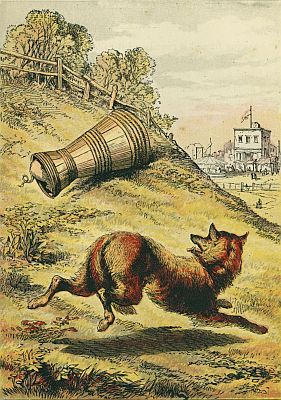
Well, he huffed, and he puffed, and he huffed, and he puffed, and he puffed, and he huffed; but he could not get the house down. When he found that he could not, with all his huffing and puffing, blow the house down, he said, "Little pig, I know where there is a nice field of turnips." "Where?" said the little pig. "Oh, in Mr. Smith's Home-field, and if you will be ready to-morrow morning I will call for you, and we will go together, and get some for dinner." "Very well," said the little pig "I will be ready. What time do you mean to go?" "Oh, at six o'clock." Well, the little pig got up at five, and got the turnips before the wolf came—(which he did about six)—and said, "Little pig, are you ready?" The little pig said, "Ready! I have been,[8][7][6] and come back again, and got a nice pot-full for dinner." The wolf felt very angry at this, but thought that he would be up to the little pig somehow or other, so he said, "Little pig, I know where there is a nice apple-tree." "Where?" said the pig. "Down at Merry-garden," replied the wolf, "and if you will not deceive me I will come for you, at five o'clock to-morrow, and we will go together and get some apples." Well, the little pig bustled up the next morning at four o'clock, and went off for the apples, hoping to get back before the wolf came; but he had further to go, and had to climb the tree, so that just as he was coming down from it, he saw the wolf coming, which, as you may suppose, frightened him very much. When the wolf came up he said, "Little pig, what! are you here before me? Are they nice apples?" "Yes, very," said the little pig. "I will throw you down one;" and he threw it so far, that, while the wolf was gone to pick it up, the little pig jumped down and ran home. The next day the wolf came again, and said to the little pig, "Little pig, there is a fair at Shanklin this afternoon, will you go?" "Oh yes," said the pig, "I will go: what time shall you be ready?" "At three," said the wolf. So the little pig went off before the time as usual, and got to the fair, and bought a butter-churn, which he was going home with, when he saw the wolf coming. Then he could not tell what to do. So he got into the churn to hide, and[10][9] by so doing turned it round, and it rolled down the hill with the pig in it, which frightened the wolf so much, that he ran home without going to the fair. He went to the little pig's house, and told him how frightened he had been by a great round thing which came down the hill past him. Then the little pig said, "Ha! I frightened you then. I had been to the fair and bought a butter-churn, and when I saw you, I got into it and rolled down the hill." Then the wolf was very angry indeed, and declared he would eat up the little pig, and that he would get down the chimney after him. When the little pig saw what he was about, he hung on the pot full of water, and made up a blazing fire, and just as the wolf was coming down, took off the cover, and in fell the wolf; so the little pig put on the cover again in an instant, boiled him up, and eat him for supper, and lived happy ever afterwards.
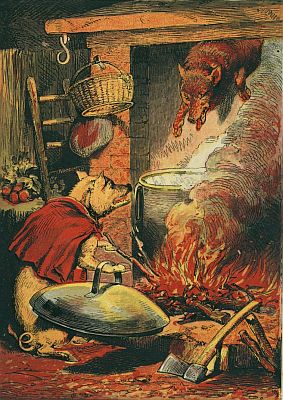
[11]
[1]
[2]
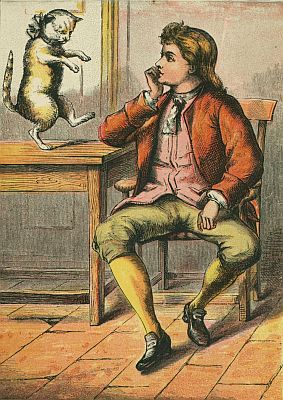
[3]
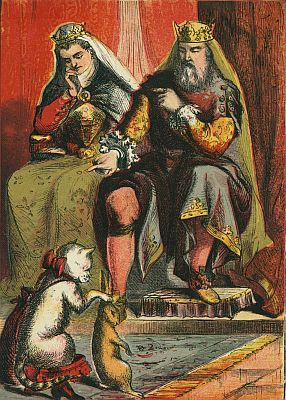
Once upon a time there was a miller who had three sons. When he was dying he left each of them a legacy. To his eldest son he left his mill; to the second his ass; and to the youngest his cat. The poor boy was very sad when he found that he had nothing belonging to him but a cat; but to his great surprise, puss jumped on the table, and said in a friendly manner: "Do not be sad my dear master. Only buy me a pair of boots and a bag, and I will provide for you and myself." So the miller's son, who had a shilling or two in his pocket, bought a smart little pair of boots and a bag, and gave them to puss, who put some bran and sow-thistles into his bag, opened the mouth of it, and lay down in a rabbit warren. A foolish young rabbit jumped into it; puss drew the string and soon killed it. He went immediately to the palace with it. He found the king and queen sitting on their throne; and bowing low, he laid the rabbit at the king's feet, saying: "Please your majesty, my master, the Marquis de Carrabas, has sent you a rabbit from his warren, as a mark of respect." "I am much obliged to the Marquis," said the king, and he ordered the rabbit to be taken[5][4] to the cook, and a piece of money to be given to the cat. Puss, much pleased, took a rabbit daily to the king as a gift from his master, till his majesty was well acquainted with the name of the Marquis de Carrabas, and with his wonderful cat. There was a very rich and cruel Ogre living in that country. One day puss went to call on him, and the ogre was quite amazed at hearing a cat talk; it was the first time too he had seen a "Puss in Boots." "Is it true, most wonderful ogre," said Puss, "that you can change yourself into any creature you please?" "Quite true, as you shall see," said the ogre, and he changed himself into a lion, and roared so terribly, that the cat climbed up the wall out of his way. Then the ogre resumed his own ugly shape, and laughed at puss's fear. "It was very surprising," said the cat; "you are of such a grand size that I do not wonder you could become a lion—but could you change yourself into some very small animal?" "You shall see," said the stupid vain ogre, and he turned into a mouse. Directly puss saw him in that shape, he darted at him and eat him up. The ogre quite deserved it, for he had eaten many men himself. Then puss made haste back to his master, and said, "Come and bathe in the river, and when the king comes by, do exactly as I tell you, for I see his carriage." The miller's son obeyed his friend the cat, undressed and jumped into the water, and cunning puss ran away with his clothes and hid[8][7][6] them under a large stone. By-and-bye the king drove by with his daughter. Puss began to call very loud "Help, help! or my lord Marquis de Carrabas will be drowned." The king stopped the coach directly, and asked what was the matter. Puss answered, that while his master was bathing, some thieves had stolen his clothes, and that therefore the marquis could not come out of the water. The king luckily had a dress suit with him, so he sent it by a servant to the Marquis, and desired him to accept a seat in the royal coach, and he would drive him home.
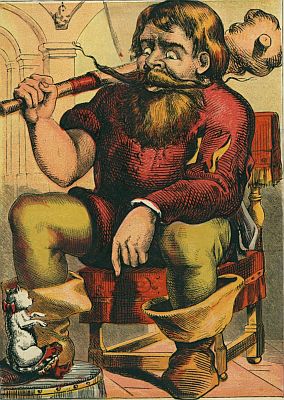
| 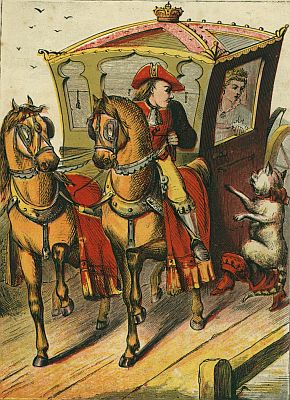
|
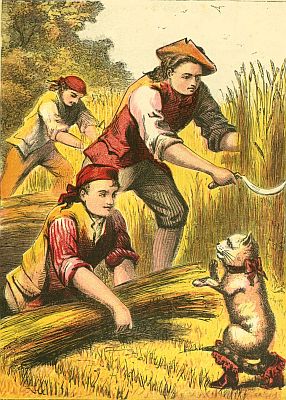
The miller's son looked very well in his fine clothes, and the king was pleased with his appearance. Puss directed the coachman to drive to the late ogre's castle, and then he ran on before. Coming to a large field in which reapers were at work, he said, "If the king asks you to whom these fields belong, you must say, to the Marquis de Carrabas, or you shall all be chopped as small as mincemeat." The men were so astonished at hearing a cat talk, that they dared not refuse; so when the king came by and asked, whose fields are these? they said, "they belong to the Marquis de Carrabas." Next puss came to some meadows with shepherds and flocks of sheep, and said the same to them. So when the king asked them, whose flocks are these? they answered, those of the Marquis de Carrabas.[9]
Puss ran on all over the dead ogre's land and said the[10] same thing to the woodmen and the gamekeepers on the road, who all obeyed him, till the king at last said to the miller's son, "You have a fine property, my lord Marquis de Carrabas." When puss came to the ogre's castle, he stood on the steps and waited till the coach drove up.
"Will your majesty honour my lord by taking some refreshment," he said; and the king who had not so fine a castle belonging to himself, alighted from his carriage and entered the house. Now, the ogre was just going to his dinner when puss had called and killed him, so there was a very fine feast upon the table. Puss told the ogre's servants they should be made into mincemeat if they did not consent to take the Marquis de Carrabas for their master, and they were glad to serve him instead of the ogre. The king took such a fancy to the rich Marquis de Carrabas, that he gave him the princess for his wife. They lived in the ogre's fine castle (which puss presented to his master), and the most faithful and the happiest of their servants was "Puss in Boots."[11]
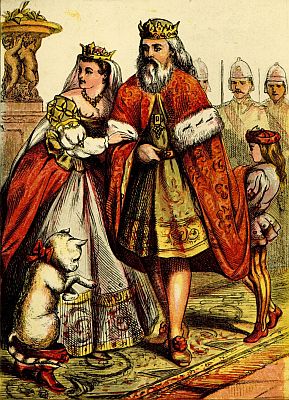
[1]
[2]
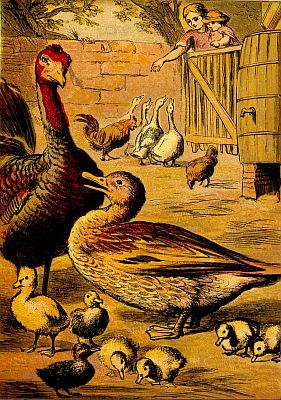
[3]
But how could the ugly duckling do so? The whole farm-yard laughed at him. The ducks pecked him, the fowls beat him, the girl who fed the poultry drove him away with a stick.[4]
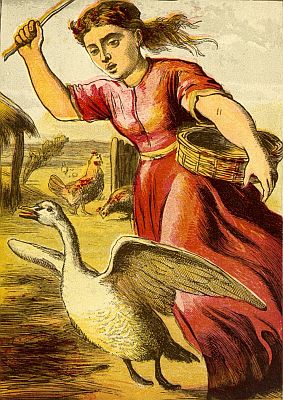
[5]
The poor duckling flew over the pailings, and joined some wild ducks who lived on the moor. "You are very ugly," said the wild ducks; "but that will not matter if you do not want to marry into our family." After he had been on the moor two days, he made friends with some wild geese, and had nearly consented to fly over the sea with them, when "pop, pop," went a gun, and the poor gosling fell dead in the water. The poor duckling was so frightened that he hid himself amongst the rushes. When all was quiet again, he came out and ran over the moor till he reached a tumble-down cottage, the door of which was ajar. He crept in, and stayed there all night. A woman, a cat, and a hen lived in this cottage. The hen had such short legs that her mistress called her "Chickie short legs." The old woman let the duckling live in her house, hoping that by-and-bye it might lay eggs. Now the cat was the master of the house, and the hen was the mistress, and they always said, "We and the world," because they thought themselves half the world, at least. One day the duckling said sadly, "It is very dull here, how much I should like to swim in the water and to dive." "What a foolish idea," said the hen. "You have nothing else to do, therefore you have strange fancies. If you could purr or lay eggs they would pass away; ask the cat, he is the cleverest animal I know, if he would like to dive in the water; ask our old mistress,[8][7][6] there is no one in the world more clever than she is; do you think she would like to let the water close over her head?" "You don't understand me," said the duckling. "I think I must go into the world again." "Very well, go," said the hen; and the duckling went.
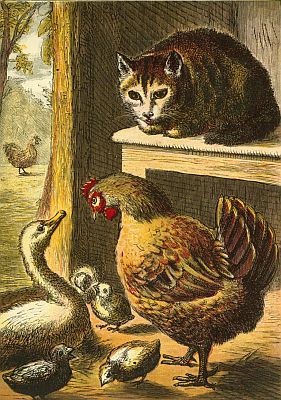
| 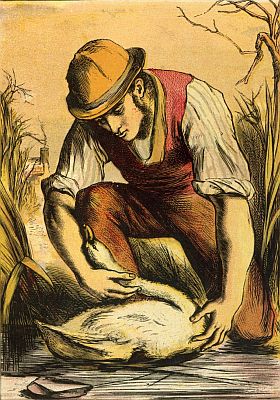
|
Very near the cottage he found some water, where he could swim and dive; but all creatures avoided him because he was so ugly, therefore he was always alone. One evening there came a beautiful flock of birds out of the bushes. They curved their graceful necks, while their soft plumage shone with dazzling whiteness. The duckling felt quite a strange sensation as he watched them fly up in the air. He stretched out his neck towards them, and uttered a cry so strange that it frightened himself. How he loved the white birds! how he longed to be with them.
By-and-bye winter came, and froze the water quite hard. The ice crackled round the duckling and at last shut him in, so that he could not get out. Early in the morning a peasant who was passing saw what had happened, broke the ice with his axe, took up the duckling, and carried it home to his wife.
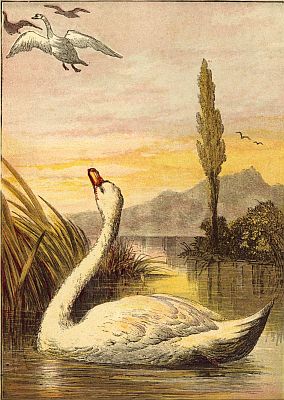
The warmth revived the poor thing and it began to fly about; the children wanted to play with it, but they only frightened it; it ran to the door which was open, and[10][9] managed to slip away among the bushes, where it lay down in the new fallen snow.
It would be very sad to tell you all the duckling suffered that cold winter; but spring came at last, and the young bird felt that his wings were grown strong. He flew away, and stopped at last in a beautiful garden near a fine piece of water. On it he saw two magnificent white birds swimming. "I will fly to those royal birds," he thought, "they will kill me because I am ugly; but I had rather be killed by them than pecked by ducks, or beaten by hens." So he flew to the water and swam towards the swans. "Kill me," he said, as they sailed towards him, and he bowed his head meekly. But what did he see in the stream? Not a dark grey ugly duckling, but a beautiful swan! To be born in a duck's nest in a farm-yard, does not matter to a bird, if it is hatched from a swan's egg. Yes, he too was a swan. Now he would have friends to love him, and nobody would scorn and ill-use him any more. Ho rustled his feathers, curved his slender neck and cried joyfully, "I never thought such good was in store for me when I was an ugly duckling."
Obvious punctuation errors repaired.
The remaining correction made is indicated by a dotted line under the correction. Scroll the mouse over the word and the original text will appear.